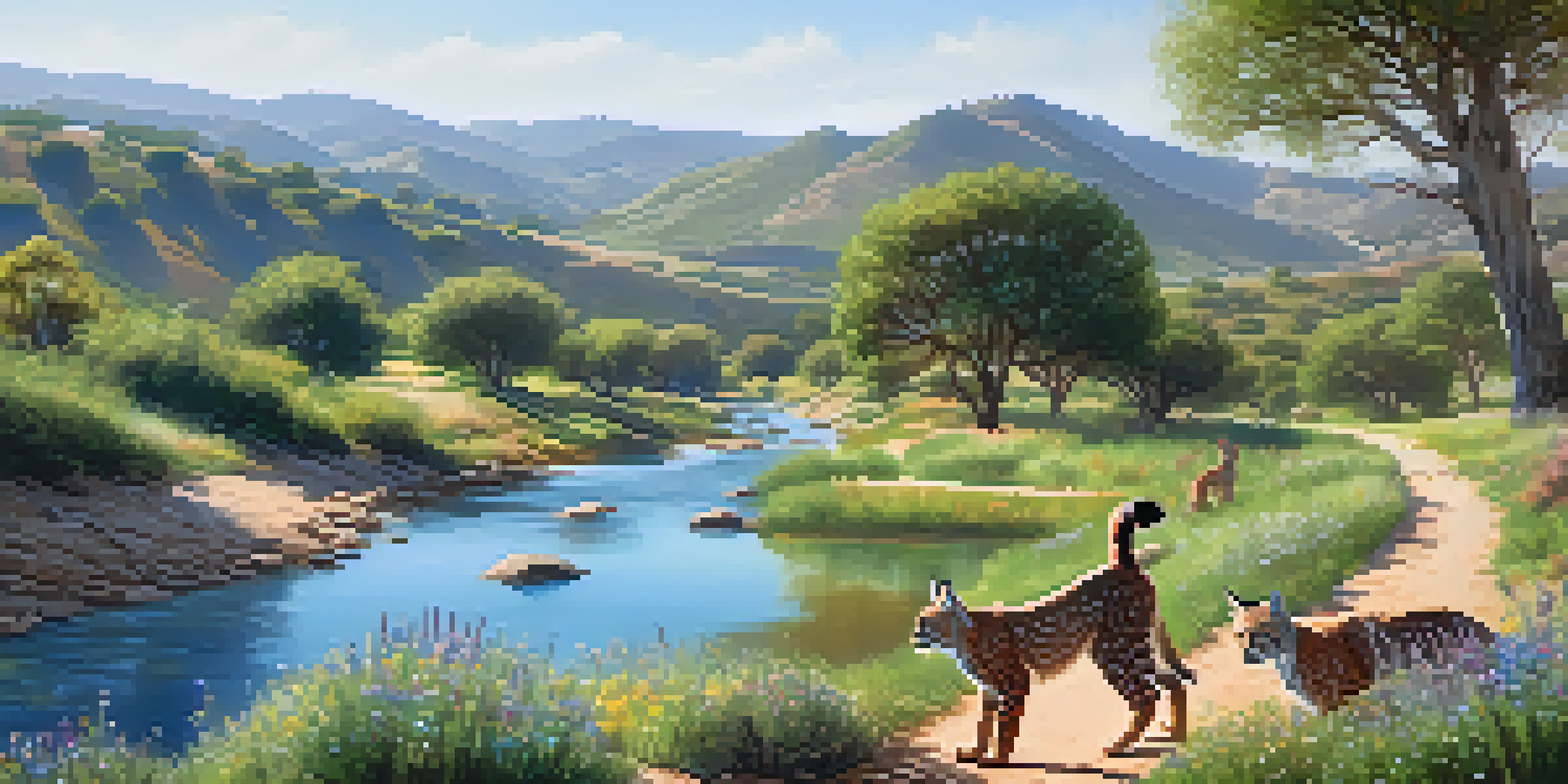Exploring Spain's Endangered Species in Nature Parks

The Importance of Nature Parks in Spain
Nature parks in Spain play a vital role in conserving biodiversity. These protected areas offer a refuge for various species, especially those that are endangered. By preserving their natural habitats, these parks help maintain ecological balance and promote sustainable tourism.
In every walk with nature one receives far more than he seeks.
In Spain, nature parks are not just about scenic views; they are critical for the survival of many unique species. With diverse ecosystems ranging from mountains to wetlands, these parks provide essential resources for wildlife. This diversity allows different species to thrive, ensuring the health of the environment.
Moreover, nature parks serve as educational platforms for visitors. They raise awareness about the importance of protecting endangered species and the need for conservation efforts. By engaging the public, these parks foster a sense of responsibility toward preserving Spain's natural heritage.
Highlighting Spain's Endangered Species
Spain is home to a variety of endangered species, each with its own unique story. From the Iberian lynx, one of the world's most endangered cats, to the majestic Spanish imperial eagle, these animals face numerous threats. Habitat loss, climate change, and poaching are among the challenges they encounter.

The Iberian lynx, for instance, has seen its population dwindle due to habitat destruction and a decline in its primary prey, the European rabbit. Conservation efforts have been implemented, including breeding programs and habitat restoration, to help this iconic species bounce back. The lynx's recovery is a symbol of hope for other endangered species in Spain.
Nature Parks Preserve Biodiversity
Spain's nature parks are essential for conserving endangered species and maintaining ecological balance.
Similarly, the Spanish imperial eagle has become a focal point for conservationists aiming to protect this magnificent bird. With only a few hundred pairs remaining, their survival hinges on habitat preservation and reducing human interference. Initiatives aimed at monitoring their nests and educating local communities are crucial steps toward ensuring their future.
The Role of Conservation Organizations
Conservation organizations play a pivotal role in protecting endangered species in Spain's nature parks. These groups work tirelessly to raise awareness, fund research, and implement conservation strategies. Their efforts are essential for the survival of vulnerable species and the ecosystems they inhabit.
The Earth does not belong to us: we belong to the Earth.
For example, organizations like WWF Spain and SEO/BirdLife collaborate with local communities and governments to promote sustainable practices. They organize educational programs, engage in habitat restoration, and advocate for stronger environmental policies. Through these initiatives, they empower individuals to take part in conservation efforts.
Additionally, these organizations often spearhead fundraising campaigns to support fieldwork and research. By mobilizing resources, they can address pressing issues such as habitat loss and species monitoring. Their commitment is vital for the long-term success of conservation projects across Spain.
Visitor Impact on Endangered Species
While nature parks are crucial for conservation, they also face challenges due to tourism. Increased visitor traffic can lead to habitat degradation and disturbances to wildlife. It's essential for park management to find a balance between allowing access and protecting endangered species.
For instance, certain areas may need to be restricted during breeding seasons to minimize human impact. Educating visitors about the significance of these species can foster respect and responsible behavior. When tourists understand their role in conservation, they can contribute positively to the ecosystem.
Conservation Efforts Are Crucial
Organizations play a vital role in protecting endangered species through awareness, research, and community engagement.
Moreover, sustainable tourism practices can enhance conservation efforts. By supporting local economies and promoting eco-friendly activities, visitors can help fund initiatives aimed at protecting endangered species. A mindful approach to tourism can ensure that nature parks continue to thrive.
Success Stories in Species Recovery
There are inspiring success stories in the recovery of endangered species in Spain. The Iberian lynx, once on the brink of extinction, has seen its numbers gradually increase thanks to dedicated conservation efforts. This turnaround showcases the impact of focused initiatives and community involvement.
Another notable example is the recovery of the European bison in the forests of Cabañeros National Park. After being extinct in the wild, breeding programs and reintroduction efforts have helped re-establish a population. These successes highlight the importance of perseverance in conservation.
These positive outcomes not only restore populations but also boost local ecosystems. As species recover, they contribute to biodiversity and the overall health of their habitats. These stories inspire hope and demonstrate that collective efforts can lead to meaningful change.
The Future of Spain's Endangered Species
Looking ahead, the future of Spain's endangered species depends on continued commitment to conservation. As climate change and environmental pressures grow, proactive measures are necessary to ensure their survival. This includes habitat protection, species monitoring, and community engagement.
Innovative strategies, such as creating wildlife corridors, can help mitigate habitat fragmentation. These corridors allow species to migrate safely between habitats, enhancing genetic diversity and resilience. By anticipating challenges, conservationists can better prepare for the future.
Tourism Affects Wildlife Conservation
While tourism can support conservation, it also poses challenges that require careful management to protect habitats.
Public involvement is equally crucial in shaping conservation policies. By advocating for sustainable practices and supporting local initiatives, individuals can play a role in protecting endangered species. Together, communities can create a positive impact that resonates for generations to come.
How You Can Help Protect Endangered Species
Everyone can contribute to the protection of endangered species in Spain, starting with simple actions. Supporting conservation organizations through donations or volunteering can make a significant difference. These contributions help fund essential programs and raise awareness.
Additionally, practicing responsible tourism is vital. When visiting nature parks, stick to designated trails and avoid disturbing wildlife. Being mindful of your impact ensures that these ecosystems remain intact for future generations to enjoy.

Lastly, educating others about the importance of conservation can amplify your impact. Share what you learn about endangered species and their habitats with friends and family. Raising awareness fosters a culture of respect and protection for the natural world.